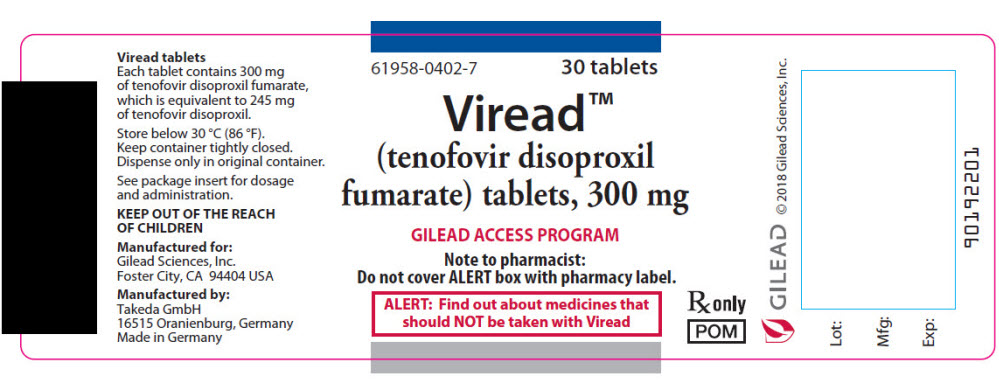Viread
Generic name: tenofovir disoproxil
Drug class: Nucleoside reverse transcriptase inhibitors (NRTIs)
Medically reviewed by A Ras MD.
What is Viread?
Viread is a prescription medicine that is used to treat HIV-1 infection when used with other anti-HIV-1 medicines in adults and children 2 years of age and older who weigh at least 22 pounds (10 kg). HIV is the virus that causes AIDS (Acquired Immune Deficiency Syndrome).
It is also used to treat HBV infection in adults and children 2 years of age and older who weigh at least 22 pounds (10 kg). It is not known if VIREAD is safe and effective in children under 2 years of age.
Description
VIREAD is the brand name for tenofovir disoproxil fumarate (TDF) (a prodrug of tenofovir) which is a fumaric acid salt of bis-isopropoxycarbonyloxymethyl ester derivative of tenofovir. TDF is converted in vivo to tenofovir, an acyclic nucleoside phosphonate (nucleotide) analog of adenosine 5′-monophosphate. Tenofovir exhibits activity against HIV-1 reverse transcriptase.
The chemical name of TDF is 9-[(R)-2-[[bis[[(isopropoxycarbonyl)oxy]methoxy]phosphinyl]methoxy]propyl]adenine fumarate (1:1). It has a molecular formula of C19H30N5O10P ∙ C4H4O4 and a molecular weight of 635.52. It has the following structural formula:

Tenofovir disoproxil fumarate is a white to off-white crystalline powder with a solubility of 13.4 mg/mL in distilled water at 25 °C. It has an octanol/phosphate buffer (pH 6.5) partition coefficient (log p) of 1.25 at 25 °C.
VIREAD tablets are for oral administration. Each tablet contains 300 mg of TDF, which is equivalent to 245 mg of tenofovir disoproxil, and the following inactive ingredients: croscarmellose sodium, lactose monohydrate, magnesium stearate, microcrystalline cellulose, and pregelatinized starch. The tablets are coated with Opadry II 32K18425, which contains hypromellose 2910, lactose monohydrate, titanium dioxide, and triacetin.
In this insert, all dosages are expressed in terms of TDF except where otherwise noted.
What is the most important information I should know about Viread?
Viread can cause serious side effects, including:
- Worsening of Hepatitis B virus infection (HBV). Your healthcare provider will test you for HBV and HIV before starting treatment with Viread. If you have HBV infection and take Viread your HBV may get worse (flare-up) if you stop taking Viread. A “flare-up” is when your HBV infection suddenly returns in a worse way than before.
- Do not run out of Viread. Refill your prescription or talk to your healthcare provider before your Viread is all gone.
- Do not stop taking Viread without first talking to your healthcare provider.
- If you stop taking Viread, your healthcare provider will need to check your health often and do blood tests regularly to check your HBV infection. Tell your healthcare provider about any new or unusual symptoms you may have after you stop taking Viread.
For more information about side effects, see “What are the possible side effects of Viread?”
What should I tell my healthcare provider before taking Viread?
Before you take Viread, tell your healthcare provider about all of your medical conditions, including if you:
- have liver problems, including HBV infection
- have kidney problems or receive kidney dialysis treatment
- have bone problems
- have HIV infection
- are pregnant or plan to become pregnant. Tell your healthcare provider if you become pregnant during treatment with Viread.
Pregnancy Registry. There is a pregnancy registry for women who take Viread during pregnancy. The purpose of this registry is to collect information about the health of you and your baby. Talk to your healthcare provider about how you can take part in this registry. - are breastfeeding or plan to breastfeed. Viread can pass to your baby in your breast milk.
- Do not breastfeed if you have HIV-1 because of the risk of passing HIV-1 to your baby.
- If you take Viread for treatment of HBV infection, talk with your healthcare provider about the best way to feed your baby.
Tell your healthcare provider about all the medicines you take, including prescription and non-prescription medicines, vitamins, and herbal supplements.
Some medicines may interact with Viread. Keep a list of your medicines and show it to your healthcare provider and pharmacist when you get a new medicine.
- You can ask your healthcare provider or pharmacist for a list of medicines that interact with VIREAD.
- Do not start a new medicine without telling your healthcare provider. Your healthcare provider can tell you if it is safe to take Viread with other medicines.
How should I take Viread?
- Take Viread exactly as your healthcare provider tells you to take it.
- Do not change your dose or stop taking Viread without first talking with your healthcare provider. Stay under a healthcare provider’s care when taking Viread.
- Take Viread at the same time every day.
- For adults and children 2 years of age and older who weigh at least 77 pounds (35 kg), the usual dose of Viread is one 300 mg tablet each day.
- For children 2 years of age and older who weigh between 37 pounds (17 kg) and 77 pounds (35 kg), your healthcare provider will prescribe the right dose of Viread tablets based on your child’s body weight.
- Adults and children 2 years of age and older who weigh at least 22 pounds (10 kg) and who are unable to swallow Viread tablets whole, may take Viread powder. Your healthcare provider will prescribe the right dose of Viread powder based on your or your child’s body weight.
- Tell your healthcare provider if you or your child has problems with swallowing tablets.
- If your healthcare provider prescribes Viread powder for you or your child, see the Instructions for use that comes with your Viread powder for information about the right way to measure and take Viread powder.
- Take Viread tablets by mouth, with or without food.
- Do not miss a dose of Viread. Missing a dose lowers the amount of medicine in your blood. Refill your VIREAD prescription before you run out of medicine.
- If you take too much Viread, call your local poison control center or go right away to the nearest hospital emergency room.
What are the possible side effects of Viread?
Viread may cause serious side effects, including:
- See “What is the most important information I should know about Viread?”
- New or worse kidney problems, including kidney failure. Your healthcare provider should do blood and urine tests to check your kidneys before you start and during treatment with Viread. Your healthcare provider may tell you to take Viread less often, or to stop taking Viread if you get new or worse kidney problems.
- Changes in your immune system (Immune Reconstitution Syndrome) can happen when an HIV-1 infected person starts taking HIV medicines. Your immune system may get stronger and begin to fight infections that have been hidden in your body for a long time. Tell your healthcare provider right away if you start having new symptoms after starting your Viread for the treatment of HIV-1 infection.
- Bone problems can happen in some children or adults who take Viread. Bone problems include bone pain, or softening or thinning of bones, which may lead to fractures. Your healthcare provider may need to do tests to check your bones or your child’s bones.
- Too much lactic acid in your blood (lactic acidosis). Too much lactic acid is a serious but rare medical emergency that can lead to death. Tell your healthcare provider right away if you get these symptoms: weakness or being more tired than usual, unusual muscle pain, being short of breath or fast breathing, stomach pain with nausea and vomiting, cold or blue hands and feet, feel dizzy or lightheaded, or a fast or abnormal heartbeat.
- Severe liver problems. In rare cases, severe liver problems can happen that can lead to death. Tell your healthcare provider right away if you get these symptoms: skin or the white part of your eyes turns yellow, dark “tea-colored” urine, light-colored stools, loss of appetite for several days or longer, nausea, or stomach-area pain.
The most common side effects in all people taking Viread are:
In some people with advanced HBV-infection, other common side effects may include:
- fever
- itching
- vomiting
- stomach-area pain
- dizziness
- sleeping problems
These are not all the possible side effects of Viread.
Call your doctor for medical advice about side effects. You may report side effects to FDA at 1-800-FDA-1088.
General information about the safe and effective use of Viread
Medicines are sometimes prescribed for purposes other than those listed in a Patient Information leaflet. Do not use Viread for a condition for which it was not prescribed. Do not give Viread to other people, even if they have the same condition you have. It may harm them. You can ask your pharmacist or healthcare provider for information about Viread that is written for health professionals.
A vaccine is available to protect people at risk for becoming infected with HBV. You can ask your healthcare provider for information about this vaccine.
How should I store Viread?
- Store Viread tablets or powder at room temperature between 68°F to 77°F (20°C to 25°C).
- Keep Viread in the original container.
- Keep the bottle tightly closed.
- Do not use Viread if the seal over the bottle opening is broken or missing.
Keep Viread and all medicines out of the reach of children.
What are the ingredients in Viread?
Active ingredient: tenofovir disoproxil fumarate
Inactive ingredients:
Viread tablets: croscarmellose sodium, lactose monohydrate, magnesium stearate, microcrystalline cellulose, and pregelatinized starch.
Viread powder: mannitol, hydroxypropyl cellulose, ethylcellulose, and silicon dioxide.
Tablet coating:
Viread tablets 300 mg: Opadry II Y-30-10671-A, which contains FD&C blue #2 aluminum lake, hypromellose 2910, lactose monohydrate, titanium dioxide, and triacetin.
Viread tablets 150, 200, and 250 mg: Opadry II 32K-18425, which contains hypromellose 2910, lactose monohydrate, titanium dioxide, and triacetin.
Label
PRINCIPAL DISPLAY PANEL – 300 MG TABLET BOTTLE LABEL
- 61958-0402-730 tablets
- Viread™ (tenofovir disoproxil fumarate) tablets, 300 mg
- GILEAD ACCESS PROGRAM
- Note to pharmacist: Do not cover ALERT box with pharmacy label.
- ALERT: Find out about medicines that should NOT be taken with Viread
- Rx only
- POM

![]()
SRC: NLM .
